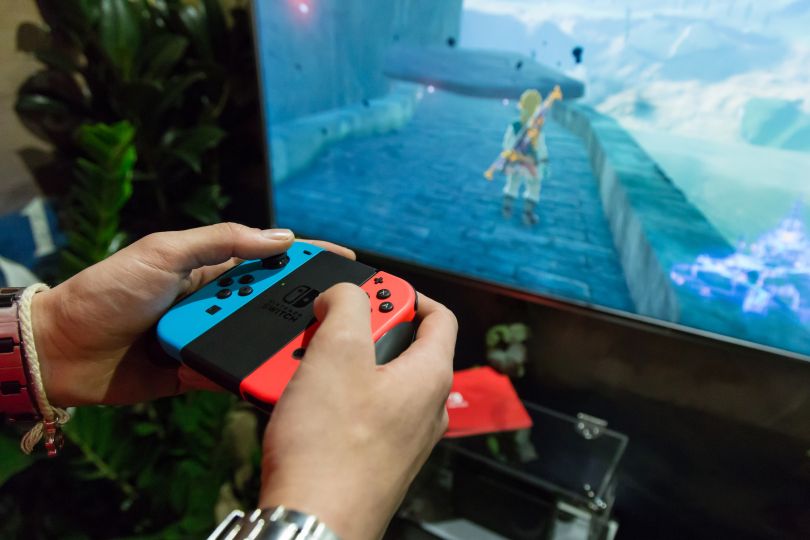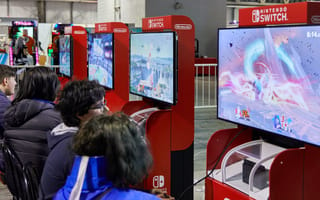For gamers, Christmas comes once every seven years.
That’s about how long it takes for Sony, Microsoft and Nintendo to design, develop and release new consoles. PC gamers are able to stick closer to the actual calendar year, thanks to the fact that they can upgrade their “rigs” in a piecemeal fashion following the release of new graphics cards, processors, memory and other components.
For years, the gaming industry has followed this cycle, where evolution centers on how quickly console makers and computer companies can roll out new hardware. But that cycle is about to be broken by 5G.
For the gaming industry, 5G has the potential to do more than enable gamers to download massive titles in minutes and make lag a relic of the past. The next-generation cellular network could lead to a dynamic shift in how and where video games are played, with gamers able to choose between playing on traditional consoles or streaming the latest releases to their smartphone, tablet or TV. Mobile gaming will also stand to benefit, as developers become unbound by the technical limits of smartphones.
The race to build the first 5G-capable console could come down to a single company and whether or not they believe the opportunity to become the industry’s new standard-bearer for innovation outweighs the costs.

Bringing Gameplay and Game Development to the Cloud
In October 2018, Electronic Arts announced “Project Atlas,” a cloud-based video game streaming service and development platform. In a lengthy blog post, CTO Ken Moss detailed the company’s vision for the platform, including multiplayer games with thousands of players on maps that thousands of kilometers, terrain-building algorithms that simplify the process of creating realistic in-game worlds, and hyper-realistic graphics.
If this all sounds incredibly aspirational, that’s because it is. Even still, Moss said in a 2018 interview with Variety that a future where games are streamed from the cloud, and developed on it too, isn’t so far away.
“I think people are underestimating how soon this will happen,” Moss told Variety. “There are two trends driving this. Number one is cloud capabilities. There is amazing public cloud investment happening. The second trend is 5G. When 5G comes, and it is coming fast, it’s going to make this a no-brainer. We will have very high bandwidth and very low latency.”
Time has proven Moss’ prediction correct. Staida, Google’s gaming streaming service, launched in November 2019, while GeForce Now, a rival platform from graphics card company NVIDIA, went live this past February. A release date hasn’t been announced yet for xCloud, but Microsoft has been publicly testing its streaming service since October 2019. EA hasn’t provided an update on Project Atlas’ development since announcing a two-week public beta back in the fall of 2019.
For EA, there doesn’t appear to be any need to rush Project Atlas out the door. If anything, an extended development timeline should benefit the company, giving it more time for 5G networks around the globe to come online. In its hands-on test of Project Atlas, PCMag noted that games aren’t yet running at full power due to how much data is needed to stream 4K video. Once the switch to 5G is complete, gamers should have more than enough speed and bandwidth to stream high-quality console games to their tablets, smartphones and TVs.

Console-Quality Smartphone Games
The year is 2010 and Facebook users around the world are getting invitations to visit virtual farms, play poker and join mafias. “Farmville,” “Zynga Poker” and “Mafia Wars” were all wildly popular among Facebook users in the late 2000s and early 2010s, with each title boasting tens of millions of monthly players at their peaks. The success of these games, among others, catapulted Zynga from a gaming startup to a publicly traded company in just four years.
Zynga initially struggled to capitalize on the growth of smartphone gaming, but in 2016, Frank Gibeau, who previously served as executive vice president of EA Mobile, joined the company as CEO and began a mobile-first turnaround project. More than 90 percent of the company’s revenue is derived from mobile gaming, which Gibeau expects will be completely transformed by the widespread roll out of 5G.
“5G is going to be a real tailwind for growth in mobile,” said Gibeau in an interview with Bloomberg. “You’ll be able to have games that are zero downloads where you can play them right over the air and never have them installed on your phone. If you’re looking at an ad on Instagram you’ll be able to touch that ad and quickly be able to play the game without having to go to the App Store.”
Gibeau is referring to the ability to stream games directly to smartphones. If 5G is capable of reaching its full potential, people will be able to stream console-quality games onto their smartphones. For Zynga and other mobile gaming companies, 5G could serve as a springboard for launching new franchises that combine the addictive nature of mobile games with the cinematic quality and advanced gameplay mechanics of console titles.
“When you look at the history of games over the last years, anytime game developers were given [an even bigger] bandwidth, they innovated in ways they didn’t expect,” Gibeau told CNBC.

The World’s First 5G Console
Both Sony and Microsoft have yet to mention whether their new consoles will be 5G-capable, but it wouldn’t be surprising if both the PS5 and Xbox Series X shipped without any ability to connect to the new cellular network at all.
At the moment, 5G doesn’t exactly make sense for Sony or Microsoft. Their consoles are designed to be played at home, which gives gamers the option to plug them directly into their wireless routers if they need more speed. Then there’s the antenna issue: Lenovo crammed nine antennas into its new 5G laptop to ensure users would have the strongest signal possible.
While 5G-capable consoles may not make sense at the moment for Sony and Microsoft, it’s a different story for Nintendo. The Nintendo Switch is designed to be played on the go and could benefit from offering gamers the ability to tap into 5G networks. Ko Shiota, a director of Nintendo’s hardware division, said in a shareholder Q&A last summer that the company is keeping an eye on the technology.
“5G can send a large amount of data without latency,” Shiota said. “We are aware that this technology has been gaining a lot of attention, and Nintendo is also investigating it. However, we don’t only chase trends in technology. When considering what to offer in our entertainment and services, we think about both how the technology will be applied to gameplay and what new experiences and gameplay we can offer consumers as a result of that application.”
For Nintendo, 5G could potentially enable the Switch to pull double duty, serving as both a standalone console and a device for streaming games. In Japan, gamers can already stream “Assassin’s Creed Odyssey” and “Resident Evil 7,” two games that were previously unavailable on the Switch due to the limitations of its hardware. Nintendo is reportedly releasing a new Switch in 2021, but there has yet to be any mention of 5G capabilities. According to Shiota, the company’s primary concern is making sure a 5G Switch can be created in a cost-effective manner.
“Cost is also an extremely important factor when it comes to 5G,” Shiota told investors in the same Q&A where he confirmed Nintendo’s interest in 5G. “It’s difficult to use even an outstanding technology if the cost is too high, so we will continue to also thoroughly investigate the cost of new technologies.”
Cost will be a big factor when it comes to the impact 5G makes on gaming. If costs are through the roof, it might make more sense for gamers to simply invest in a new console or gaming PC as opposed to shelling out for a 5G-capable device, game streaming service and unlimited data package.
But that’s in the short term. In the long term, the writing on the wall is that 5G will change the gaming industry for good, ushering in a new age of mobile gaming, streaming services and game development. The only question is whether this new age will start in the next five years or 10.




